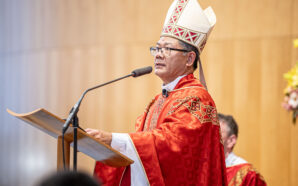History will remember his papacy for significantly enriching the church’s social thought. Pope Francis reinvigorated its approach to awaken consciences against tragedies and injustices that predominantly affect the poor, staying true to the ideals of his namesake, Francis of Assisi.
On behalf of the poor
The poor, he said, are often seen as “garbage” and treated like “parasites of society who are not even forgiven for their poverty.’” Pope Francis frequently decried what he called “an economy that kills.” He was convinced that an economy dominated by the imperialism of money could only turn against humanity and breed injustice. The severity of his remarks offended some business circles. Yet for the Argentine pope, warning against the idolatry of money and calling for the defense of the poor, are deeply rooted in the Gospel.
It is in this spirit that he established, in 2017, an annual World Day of the Poor—an opportunity for Christian communities to demonstrate that “the poor are not a problem: they are a resource from which to draw as we strive to accept and practice in our lives the essence of the Gospel.” On each of his journeys, he made a point of visiting marginalized areas to cast light on ignored or forgotten situations. He performed powerful symbolic gestures to urge care for the little ones, the poor, children, the elderly, and all that is vulnerable. Consider, for example, the bouquet of flowers he tossed into the water during his visit to Lampedusa, denouncing “the globalization of indifference” in the face of the tragedy of migrants dying at sea while trying to reach Europe—or the foot-washing on Holy Thursday of men and women living in extreme poverty or incarcerated.
For integral ecology
In 2015, just months before the Paris Climate Conference (COP21), Pope Francis published Laudato si’, an encyclical on safeguarding our common home, the Earth. The strength and relevance of this document led to its warm reception well beyond the church’s borders. In it, the pope emphasized the systemic nature of the current crisis and the necessity for a global response.
“Everything is connected” appears a dozen times in Laudato si’. “We are faced not with two separate crises, one environmental and the other social, but rather with one complex crisis which is both social and environmental,” the encyclical declared. “Strategies for a solution demand an integrated approach to combating poverty, restoring dignity to the excluded, and at the same time protecting nature.” (Laudato si’, no. 139). For Pope Francis, the ecological issue extended beyond mere environmental concerns: human and cultural biodiversity are also at risk and deserve our care.
This broad conception of ecology led him, in November 2019—just after the Synod dedicated to the Amazon—to advocate for the introduction in the Catholic Church’s Catechism of a new sin: “ecological sin.” This is defined as an “action or omission against God, against one’s neighbor, the community and the environment. It is a sin against future generations and is manifested in acts and habits of pollution and destruction of the harmony of the environment, in transgressions against the principles of interdependence, and in the breaking of networks of solidarity between creatures.”
The demanding path of fraternity
A central theme in Pope Francis’ thought was fraternity. He even dedicated an encyclical to it, Fratelli tutti, published in October 2020. He saw fraternity as a major challenge in a world that is increasingly closing in on itself—where the defense of personal, communal, or national interests tends to supplant the pursuit of the common good. This has repercussions for international relations, social dialogue, the reception of migrants, the functioning of justice, the care for the most vulnerable, and cultural diversity—issues all addressed in the encyclical. It is in the name of this universal fraternity that the pope reiterated his rejection of the “false solutions” represented by nuclear deterrence, war (which can never be just), and the death penalty—a punishment he considered contrary to the dignity of the human person.
On that very subject, Francis even influenced a change in the Catechism. Ratified in August 2018, the new wording of Article 2267 of the Catechism of the Catholic Church now stipulates the total rejection of this practice, deemed incompatible with human dignity (this article comments on the Fifth Commandment: “Thou shalt not kill,” in the chapter “You shall love your neighbor as yourself”).
For Pope Francis, there was an urgent need to work toward a society open to “dialogue and through the recognition of the values of reciprocity and mutual enrichment” (Fratelli tutti, no. 103) and in which we feel “fragility of others as we strive to build a common future” (no. 115). To him, such fraternity was not a utopian dream—he believed that God had endowed humanity with the capacity to achieve it.
Reproduced with permission by La Croix International.








